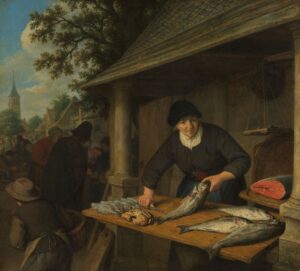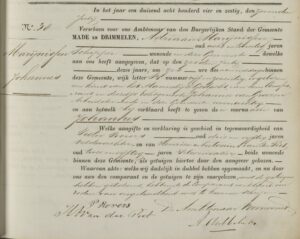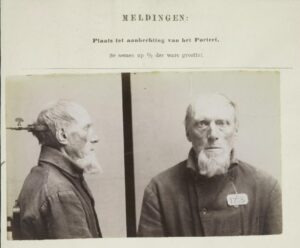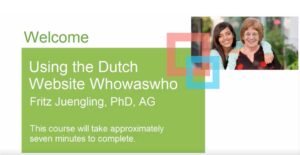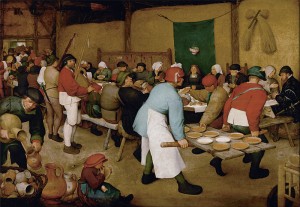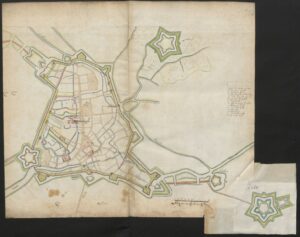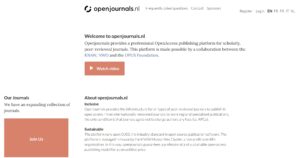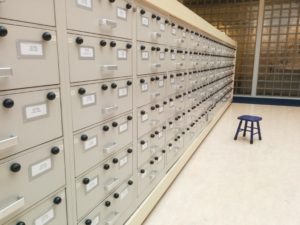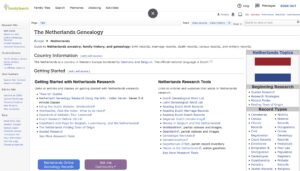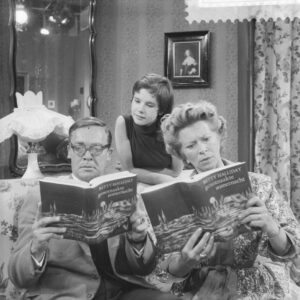Here are some details about the legal status of women in the Netherlands in 1664, as discussed in a book about Romano-Dutch Law. Legally, there is not much difference between men and unmarried women. [This is how the section of the book on rights of women starts, and then goes on to state several differences!] The minimum age to marry is 14 for men and 12 for women, with parental permission. Without parental permission, the minimum age to marry is 25 for men and 20 for women. Being … [Read more...]
About this website
Creating a website like this is a fun activity. There are so many options, so many choices. What do visitors want? What do I want? In this blog I will describe some of the things I encounter in developing and maintaining this website.
Quick tip – Mind the long S
Up until well into the twentieth century, there were two different ways to write the letter 's' in Dutch (and other languages): the regular 's' and the long 's'. The long 's' looks like an 'f' without the crossbar. The long 's' is used in different situations. In words with double 's,' the second 's' is often written in the long form. When transcribing names or words with a long 's', make sure to transcribe it correctly as an 's.' For example, the name of my ancestor in the birth record … [Read more...]
Dutch Genealogy News for August 2021
Here is an overview of the new sources, websites, and news about archives announced last month. Sources Population registers (family cards) of The Hague and Loosduinen for the period 1913-1939 are now available in better quality at the website of the The Hague City Archives. The index was corrected and new full-color scans were made. Scans including people born less than 100 years ago are not shown. Census records and population registers of Boxtel between 1810 and 1938 are now … [Read more...]
Quick tip – Video about using WieWasWie
FamilySearch features a helpful video where Fritz Juengling explains how to use the website WieWasWie (Who Was Who) for researching your ancestors in the Netherlands. Go to the video … [Read more...]
Quick tip – Compare to the neighbors
To understand your ancestors, you need to study them in their context. One way to do that is to compare your ancestors to their neighbors to get some idea of their place in the community. Here are some research questions that may help you get to know your ancestors: Did your ancestors own their home? Did most people in the community rent or own? How much did your ancestors pay in taxes? How much did other people in the neighborhood pay? How old were your ancestors when they … [Read more...]
Dutch Genealogy News for July 2021
Here is an overview of all the new online sources, projects, and other news that was announced last month. Sources German marriage records of Dutch people are now available via WieWasWie. About 40% of these abstracts date from World War II, the rest are older. The Netherlands Institute for Military History published a database with 22,500 personal files of Dutch prisoners of War during World War II. Some of them include photos. The residence cards of Buren, Beusichem and Soelen have … [Read more...]
Quick tip – Open Journals
If you are interested in reading about Dutch history, check out the website Open Journals. It provides open access to several journals, including: BMGN - Low Countries Historical Review Early Modern Low Countries Historical Life Course Studies The Rijksmuseum Bulletin TSEG - The Low Countries Journal of Social and Economic History Articles in these journals are in various languages, many in English. … [Read more...]
Quick tip – Check the finding aid or catalog for scans
When you are searching for your ancestors, it's tempting to stick to searching for their name in an online index. But only a small fraction of records have been indexed. A larger part is available online as images that have not been indexed yet. These images are often available via the catalog or finding aids on the website of archives. Look for terms like inventarissen or archieven. In some cases, the records have not been scanned yet, but the catalog or finding aid has a button to order … [Read more...]
Seven ways to find sources on FamilySearch
FamilySearch is a vast website with genealogical information, including many sources for research in the Netherlands. FamilySearch is a free genealogy website, and requires a free registration. Many people are familiar with the website, but don't realize all the different ways you can find information there. Here are my seven favorite ways to find sources on FamilySearch. Search records You can search records by name. This will find records that have been indexed, which includes many … [Read more...]
Quick tip – Beware of chapter 1
If you're lucky, your literature research may reveal a book published about your family done by genealogists in the past. Writing such books was popular in the nineteenth century, especially for prominent families, or descendants of early settlers of a colony, for example. Several such books exist for New Netherland settlers. In many of these early books, chapter 1 is where the author tries to sketch the early history of the family. This is where you find claims of royal descent, of … [Read more...]
